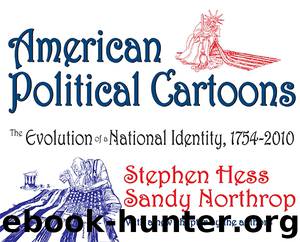American Political Cartoons by Stephen Hess & Sandy Northrop

Author:Stephen Hess & Sandy Northrop
Language: eng
Format: epub
Publisher: Routledge
Published: 2017-05-06T04:00:00+00:00
Pat Oliphant, Denver Post, July 27, 1967.
Pat Oliphant, Denver Post, August 2, 1967.
While most American-born cartoonists seemed to cower from hitting the headline-grabbing issue of civil rights head-on, Oliphant attacked it squarely, calling each incident as he saw it. In one cartoon, penned during rioting that broke out in the summer of 1967, he showed African Americans as victims of the lawlessness and looting within their own society. Two cartoons on the police, who were increasingly being called on to quell civil disturbances, show the cartoonist’s contrasting points of view. In the first cartoon, the police are protagonists; in the next they are—almost—victims. Oliphant would make many more tough calls as he settled into dissecting his new society. A penguin named “Punk” appears in most of the Australian’s work. Although Oliphant was not the first to use an alter-ego character to deliver his own commentary or a punch line, he made more consistent and better use of the technique than cartoonists before him. Punk was born when Oliphant was still living in Australia and worked for a conservative paper, the Advertiser in Adelaide. A friend had brought a penguin home in his knapsack from a trip. “It was an appealing little feller, and I incorporated it in a couple of cartoons I was doing,” Oliphant explained. “It took off. People liked it and wanted to see more. Punk’s continued use in my work after his initial good reception was far from a gimmick.” As a young cartoonist, Oliphant had to fight to have his point of view represented. The penguin gave him a chance to add his own voice to the daily cartoons which were, as Oliphant describes it, “beaten out on a committee anvil somewhere around three p.m. every day by a group of editors of differing degrees of dullness, at a gathering called The Editorial Conference. I would leave these sessions in varying states of desperation and despair. Punk saved me from this. I could at least feel that a small corner of the cartoon was mine. I think it gave me the confidence to continue.” Many other cartoonists now use similar alter-ego characters.
Download
This site does not store any files on its server. We only index and link to content provided by other sites. Please contact the content providers to delete copyright contents if any and email us, we'll remove relevant links or contents immediately.
Make Comics Like the Pros by Greg Pak(2422)
Modern Cartooning by Christopher Hart(2185)
Draw-A-Saurus by James Silvani(2103)
Creative Character Design by Bryan Tillman(1557)
Manga Crash Course Fantasy by Mina Petrovic(1554)
Manga Workshop Characters by Sophie Chan(1500)
The Absolutely True Diary of a Part-Time Indian by Sherman Alexie(1498)
How To Draw Caricatures by Lenn Redman(1355)
How to Draw a Character by Soizic Mouton(1333)
Freehand Figure Drawing for Illustrators by David H. Ross(1319)
Learn to Draw Action Heroes by Robert Marzullo(1292)
How to Draw an Object by Soizic Mouton(1281)
The DC Comics Guide to Coloring and Lettering Comics by Mark Chiarello(1270)
The DC Comics Guide to Writing Comics by Dennis O'Neil(1255)
Stan Lee's How to Draw Comics by Stan Lee(1250)
Supergods by Grant Morrison(1241)
ANIME Drawing BOX set 5-in-1: Anime Drawing for Beginners, Drawing Anime Faces, Drawing Anime Emotions, Manga Drawing for Beginners, Anime Drawing Practical Guide by Li Shen & Jane Mackle & Yuka Hiramatsu(1173)
American Political Cartoons by Stephen Hess & Sandy Northrop(1077)
Secret Teachings of a Comic Book Master by Heidi MacDonald(1050)
